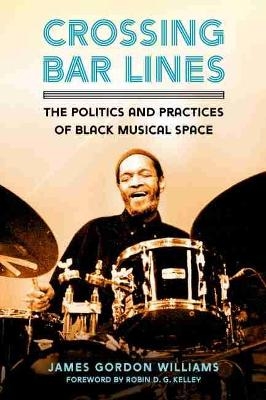
Crossing Bar Lines
The Politics and Practices of Black Musical Space
Seiten
2021
University Press of Mississippi (Verlag)
978-1-4968-3210-8 (ISBN)
University Press of Mississippi (Verlag)
978-1-4968-3210-8 (ISBN)
Reframes the nature and purpose of jazz improvisation to illuminate the cultural work being done by five creative musicians between 2005 and 2019. The political thought of these African American improvisers is documented through multilayered case studies that make explicit how these musicians articulate their positionality in broader society.
In Crossing Bar Lines: The Politics and Practices of Black Musical Space James Gordon Williams reframes the nature and purpose of jazz improvisation to illuminate the cultural work being done by five creative musicians between 2005 and 2019. The political thought of five African American improvisers-trumpeters Terence Blanchard and Ambrose Akinmusire, drummers Billy Higgins and Terri Lyne Carrington, and pianist Andrew Hill-is documented through insightful, multilayered case studies that make explicit how these musicians articulate their positionality in broader society.
Informed by Black feminist thought, these case studies unite around the theory of Black musical space that comes from the lived experiences of African Americans as they improvise through daily life. The central argument builds upon the idea of space-making and the geographic imagination in Black Geographies theory. Williams considers how these musicians interface with contemporary social movements like Black Lives Matter, build alternative institutional models that challenge gender imbalance in improvisation culture, and practice improvisation as joyful affirmation of Black value and mobility. Both Terence Blanchard and Ambrose Akinmusire innovate musical strategies to address systemic violence. Billy Higgins's performance is discussed through the framework of breath to understand his politics of inclusive space. Terri Lyne Carrington confronts patriarchy in jazz culture through her Social Science music project. The work of Andrew Hill is examined through the context of his street theory, revealing his political stance on performance and pedagogy. All readers will be elevated by this innovative and timely book that speaks to issues that continue to shape the lives of African Americans today.
In Crossing Bar Lines: The Politics and Practices of Black Musical Space James Gordon Williams reframes the nature and purpose of jazz improvisation to illuminate the cultural work being done by five creative musicians between 2005 and 2019. The political thought of five African American improvisers-trumpeters Terence Blanchard and Ambrose Akinmusire, drummers Billy Higgins and Terri Lyne Carrington, and pianist Andrew Hill-is documented through insightful, multilayered case studies that make explicit how these musicians articulate their positionality in broader society.
Informed by Black feminist thought, these case studies unite around the theory of Black musical space that comes from the lived experiences of African Americans as they improvise through daily life. The central argument builds upon the idea of space-making and the geographic imagination in Black Geographies theory. Williams considers how these musicians interface with contemporary social movements like Black Lives Matter, build alternative institutional models that challenge gender imbalance in improvisation culture, and practice improvisation as joyful affirmation of Black value and mobility. Both Terence Blanchard and Ambrose Akinmusire innovate musical strategies to address systemic violence. Billy Higgins's performance is discussed through the framework of breath to understand his politics of inclusive space. Terri Lyne Carrington confronts patriarchy in jazz culture through her Social Science music project. The work of Andrew Hill is examined through the context of his street theory, revealing his political stance on performance and pedagogy. All readers will be elevated by this innovative and timely book that speaks to issues that continue to shape the lives of African Americans today.
James Gordon Williams is a transdisciplinary musician and scholar in critical improvisation studies and popular music studies. He has collaborated with artists as varied as Cauleen Smith, Gregory Porter, and Fred Moten and performed at jazz festivals around the world. Williams is assistant professor at Syracuse University.
| Erscheinungsdatum | 12.04.2021 |
|---|---|
| Vorwort | Robin D. G. Kelley |
| Zusatzinfo | 10 musical examples; 1 table |
| Verlagsort | Jackson |
| Sprache | englisch |
| Maße | 152 x 229 mm |
| Gewicht | 435 g |
| Themenwelt | Kunst / Musik / Theater ► Musik ► Jazz / Blues |
| Kunst / Musik / Theater ► Musik ► Musiktheorie / Musiklehre | |
| ISBN-10 | 1-4968-3210-8 / 1496832108 |
| ISBN-13 | 978-1-4968-3210-8 / 9781496832108 |
| Zustand | Neuware |
| Haben Sie eine Frage zum Produkt? |
Mehr entdecken
aus dem Bereich
aus dem Bereich
zur politischen Ästhetik des Jazz
Buch | Hardcover (2023)
Phillip Reclam (Verlag)
CHF 49,90
Die Geschichte des Jazz in Deutschland
Buch | Softcover (2021)
Reclam, Philipp (Verlag)
CHF 31,90


